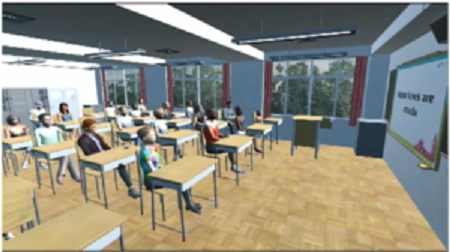A Virtual Reality Courtroom Project

By Dr Clare Jones & Francine Ryan.
Exciting new project
The Open University Law School’s, Open Justice Centre, is embarking on an exciting new project which brings together technology and law to enable immersive and active learning to take place in a practical setting. The virtual court room will provide a flexible, innovative environment to facilitate students’ learning.
The project is part of the Open Justice plan to enhance the provision of teaching and learning and knowledge exchange through the use of virtual reality technology and builds on previous work undertaken by the Centre (Mcfaul et al, 2020). Virtual reality merges realism with new levels of interactivity providing students with a more immersive and experiential learning experience. It offers the opportunity for the OU to develop and enhance its delivery of online learning to enrich our students’ learning. VR challenges us to innovate and reimagine future learning.
Aim
The aim is to provide skills and services to law students and potentially to support the work of partner organisations such as Support Through Court.
The project seeks to:
- Provide an innovative learning environment for students
- Respond to the changing nature of the delivery of learning to law students
- Continue to develop and support strong working links with partner organisations
Goal
The goal of the virtual court room is to enable students to collaborate synchronously in a court hearing to help them develop their advocacy skills. The virtual court room will be highly realistic and will create a unique immersive experience for the Open University students. The students will also have the opportunity to learn asynchronously as well in the environment. The realistic experience of the courtroom will support the development of practical legal skills which will enhance the employability of students (Mowbray, 2021).
What will it look like?
The court room will be a 3D representation of a civil law court and students will take on the form of a 3D human avatar that they will be able to tailor to their requirements. The student will be able to walk through the court room and explore different pop ups that will contain information and tasks. The student will also be able to interact with others in the room via chat and speech functions. They will be able to undertake court hearing proceedings and also can be supported by tutors during their immersion. The virtual court room could also be used through a partner organisation supporting people through the court system where they have no legal representation.
Pedagogical impact
Immersive and active learning has many benefits (Lawyer Monthly, 2020) and through experiential learning students can achieve a different and comprehensive understanding of information. The impact on retention can also be recognised (Hamilton et al, 2020).
Although the recent pandemic has forced the education sector to rely more on technology, the Open University has always placed the importance on online learning and the virtual court room will help students to use technology to achieve their educational goal more effectively.
Virtual reality has been seen to improve overall performance in students (Allcoat, von Muhlenen, 2018). The reason for this is because users really feel like they are there in the situation allowing them to develop realistic reactions through situated learning (Mayrose, J. 2012).
Future
The aim is to have the first iteration of the court room completed by the start of the next academic year. It will be used within the Open Justice Centre, but also within some of the undergraduate law modules to provide a unique and innovative learning experience, bringing law into context and ensuring students are provided with modern practices of teaching and learning within higher education.
References
- Pettinger, T. Improving legal outcomes with virtual reality. (2020) Lawyer Monthly, https://www.lawyer-monthly.com/2020/09/improving-legal-outcomes-with-virtual-reality/ accessed 1 February 2021.
- Hamilton, D., McKechnie, J., Edgerton, E. & Wilson, C. (2020), Immersive virtual reality as a pedagogical tool in education: a systematic literature review of quantitative learning outcomes and experimental design. Journal of Computers in Education, 8, 1-32 (2021).
- Allcoat, D. & von Muhlenen, A. (2018) Learning in virtual reality: Effects on performance, emotion and engagement. Research in Learning Technology. DOI: 10.25304/rlt.v26.2140
- Mayrose, J, (2012) Active learning through the use of virtual environments. American Journal of Engineering Education, 3(1): 13.
- Mcfaul, H. & FitzGerald, E. (2020) A realist evaluation of student use of a virtual reality smartphone application in undergraduate legal education. British Journal of Educational Technology, 51(2), pp. 572-589
- Mowbray, T (2021) From Virtual to Reality- A Practical Guide to Creating Educational Virtual Reality content in McKenzie, S, Garivaldis, F & Dyrer, KR (eds) (2021) Tertiary Online Teaching: Total Perspectives and Resources for Digital Education, Springer, Singapore Pte. Limited, Available from: ProQuest Ebook Central
This blog represents the views of the individual, not SCiLAB or The Open University.
Image credit: Image from Open Justice VR App where students can practice their legal presentation skills

Dr Clare Jones
Dr Clare Jones is a Senior Law Lecturer within the Law School. She specialises in banking and finance law. Her research explores technology in these areas and also how technology informs and can be used in teaching and learning. She has previously created and taught within virtual world environments.
Clare is also the co-founder of LIFT @OU_LIFT, (Law, Information, Future and Technology) research cluster.

Francine Ryan
Francine Ryan is the Director of the Open Justice Centre and Senior Lecturer in Law. Francine’s research interests are clinical legal education in particularly technology enhanced learning.
Francine has pioneered the development of a range of innovative and technologically enhanced opportunities for OU students, including the award-winning virtual law clinic.

Blog posts
- What happens when apprentices are made redundant 16th January 2024
- What is most important when integrating ‘green skills’ and sustainability topics into learning and teaching strategies? 11th December 2023
- Understanding what practice tutors in the Faculty of Business and Law need and want in their induction 6th December 2023
